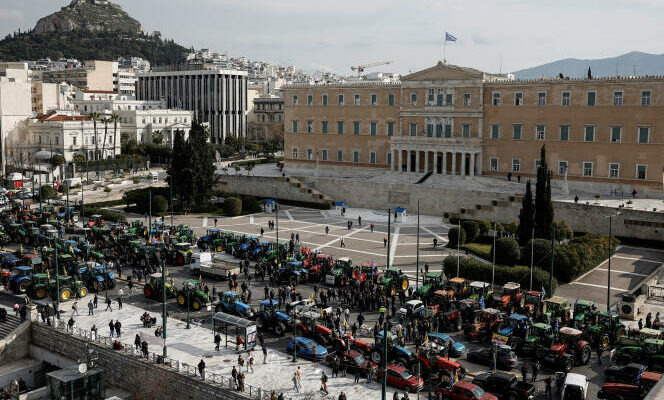At nightfall on Tuesday February 20, Syntagma Square opposite the Greek Parliament in Athens was transformed into an unusual encampment for more than 8,000 angry farmers, who came from the four corners of Greece with around a hundred tractors. The sounds of horns mixed with shocking slogans: “Without us, what will you eat?” », “Without farmers, no future!” »…
For thirty days, Thanassis Prassas has been participating in the mobilization and did not hesitate to come to Athens from the region of Thessaly, hit hard by the floods, in September 2023: “Despite the promises, five months later, we still have not been fully reimbursed and we do not know if we will be able to cultivate our land again. There are still 4 meters of water around Lake Karla where our farms are located. » Storm Daniel, which left 17 dead, also submerged nearly 73,000 hectares, according to the Copernicus emergency management service of the European Commission, and wiped out more than 80,000 animals.
Thanassis Prassas, who owns almond trees, pistachio trees and corn fields, is not upset: “We want the fuel tax to be abolished [le gazole non routier]. Other European countries have adopted this measure, and for us who have small farms and struggle to make ends meet, it is essential! »
Lower electricity bills and VAT
Energy prices increased by around 50% between 2020 and 2023, according to the Greek Statistics Authority. Energy costs between 2020 and 2021 corresponded to between 20% and 25% of the income earned, on average, by all agricultural operations in the country.
On February 13, representatives of agricultural unions were received by Prime Minister Kyriakos Mitsotakis. He announced a series of measures such as lowering electricity bills for farmers for the next ten years, implemented from 1er April or the reduction in VAT on fertilizers and animal feed, which should fall from the current 13% to 6%.
The Prime Minister also assured that financial aid to operators affected by natural disasters will be paid quickly from the end of February. After initial emergency aid of 2,000 and 4,000 euros paid respectively to farmers and breeders in 2023, the government has promised new aid which must now be provided “at 5,000 and 10,000 euros”. On Tuesday, before the arrival of the farmers in Athens, the Prime Minister announced on the Star TV television channel that he had not “nothing more to give” to farmers, the country’s financial margins being, according to him, limited.
You have 48.49% of this article left to read. The rest is reserved for subscribers.
